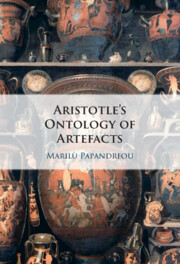Book contents
- Aristotle’s Ontology of Artefacts
- Aristotle’s Ontology of Artefacts
- Copyright page
- Dedication
- Contents
- Figures
- Acknowledgements
- Abbreviations
- Introduction
- Chapter 1 The Platonic Heritage
- Chapter 2 Using Artefacts against Plato
- Chapter 3 Aristotle’s Building Blocks in the Physics
- Chapter 4 Artefacts as Hylomorphic Compounds
- Chapter 5 Forms of Artefacts as Inert and Intermittent
- Chapter 6 The Relation between Matter and Form in Artefacts
- Chapter 7 The Relation Between Parts and Whole in Artefacts
- Chapter 8 The Physics and Metaphysics of Artefacts
- Conclusions
- Bibliography
- Index Locorum
- Subject Index
Introduction
Published online by Cambridge University Press: 14 December 2023
- Aristotle’s Ontology of Artefacts
- Aristotle’s Ontology of Artefacts
- Copyright page
- Dedication
- Contents
- Figures
- Acknowledgements
- Abbreviations
- Introduction
- Chapter 1 The Platonic Heritage
- Chapter 2 Using Artefacts against Plato
- Chapter 3 Aristotle’s Building Blocks in the Physics
- Chapter 4 Artefacts as Hylomorphic Compounds
- Chapter 5 Forms of Artefacts as Inert and Intermittent
- Chapter 6 The Relation between Matter and Form in Artefacts
- Chapter 7 The Relation Between Parts and Whole in Artefacts
- Chapter 8 The Physics and Metaphysics of Artefacts
- Conclusions
- Bibliography
- Index Locorum
- Subject Index
Summary
This book concerns the ontological status of products of art (technê) in Aristotle, in particular material objects. It makes three main advances with respect to the existing literature: the first will be of interest to contemporary metaphysicians, the second to historians of philosophy, and the third to both contemporary metaphysicians and historians of philosophy. First, the metaphysics of artefacts is increasingly gaining the attention of contemporary metaphysicians, in particular among supporters of hylomorphism, who all refer to or draw on Aristotle. However, there is no consensus about the place of artefacts within Aristotle’s ontology; indeed, there is no consensus as to whether Aristotle articulates a single coherent account of artefacts in the first place. Hence, the first contribution made by this book is to offer a complete picture of Aristotle’s account of artefacts that is sensitive to current issues and that can therefore serve as a guide for the contemporary (neo-)Aristotelian debate. Second, when it comes to technê, historians of philosophy have primarily focused on the art analogy and Aristotle’s use of examples taken from the artificial realm.
Keywords
- Type
- Chapter
- Information
- Aristotle's Ontology of Artefacts , pp. 1 - 30Publisher: Cambridge University PressPrint publication year: 2023

